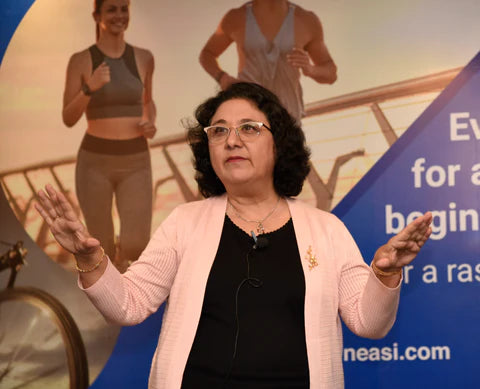By Shalu Bajaj : Fitness Expert
Exercise science is an ever-evolving field – particularly in regards to female athletes. Women are still an underrepresented field in sports science, as most of the current research focuses on males. In this article, I’ll try to rectify that, and focus on some of the challenges faced by female athletes.

Female runners may face a variety of challenges and problems, including:
- Safety concerns: Female runners can face safety issues while running alone or in poorly lit areas. It is important to be aware of your surroundings and take necessary precautions.
- Menstrual cycles: Menstruation can cause cramping and other discomforts that may affect a runner's performance. It's important to have proper hygiene products and a plan in place for managing periods while running.
- Pregnancy: Pregnant runners may face challenges related to changes in their body, such as decreased balance and increased fatigue. It is important to consult with a healthcare professional before continuing to run during pregnancy.
- Harassment: Female runners may face harassment or unwanted attention while running, which can be distressing and impact their overall experience It is important for female runners to be aware and to take steps to mitigate them, such as running in safe areas, and speaking out against harassment.
- Balancing responsibilities: Women may have to balance running with other responsibilities, such as work, caregiving, and household duties, which can make it challenging to find time to train and participate in races.
- Lack of support: Women may face a lack of support from family, friends, and coaches, leading to a lack of motivation and opportunities to train and compete.
- Menopause: It is a natural biological process that marks the end of a woman's reproductive years, and it can bring about several physical changes that can impact a female runner's performance.
Let us discuss the impact of menopause on running and exercise, what to expect with menopause and exercise in general, and tips for running through menopause.
Menopause is a natural process that occurs in women typically in their 40s or 50s, and it can cause a variety of physical and emotional symptoms. These symptoms can affect a female runner's performance and overall well-being.
Some of the problems that menopause can cause for female runners include:

- Hot flashes: Hot flashes make it hard to control our temperature during exercise and may disrupt sleep, leading to more fatigue.
- Joint pain and stiffness: Menopause can cause a decrease in estrogen levels, which can lead to joint pain and stiffness that can affect a runner's mobility and performance.
- Bone density loss: Menopause can also cause a loss of bone density, which can increase the risk of stress fractures and other injuries for runners.
- Mood swings and depression: Anxiety, a decrease in competitive drive, and depression associated with menopause can certainly interfere with your motivation to run during menopause.
- Fatigue: One of the seemingly unavoidable side effects of menopause is unexplained fatigue, which can make exercising during menopause physically difficult and motivationally unappealing.
- Weight gain: The changing hormonal profile is often associated with weight gain, which can make running harder since the weight gain is fat mass, not lean body mass.
- Decreased muscle mass: Menopause can cause a decrease in muscle mass, which can impact a runner's strength and endurance.
- Vaginal dryness: Menopause can cause a decrease in estrogen levels, which can lead to vaginal dryness and discomfort that may impact a runner's comfort during exercise.
It is important for female runners going through menopause to listen to their bodies and make adjustments to their training regimen as needed. This may include incorporating strength training exercises to improve bone density, adjusting workout intensity and frequency, and seeking medical advice to manage symptoms such as hot flashes or vaginal dryness.
Here are some tips that can help a female runner during menopause:

- Stay hydrated: Menopause can increase the risk of dehydration, so it's important to drink plenty of water and other fluids before, during, and after running. This can help maintain energy levels and reduce the risk of hot flashes.
- Incorporate strength training: Strength training can help improve bone density, which can decrease during menopause. It can also help build muscle mass, which can help maintain metabolism and decrease the risk of injury.
- Adjust training regimen: It's important to adjust training frequency and intensity to avoid injury and accommodate changes in energy levels. This can mean reducing high-impact workouts and incorporating low-impact exercises like yoga or cycling.
- Wear moisture-wicking clothing: Vaginal dryness and chafing can be common during menopause, so wearing moisture-wicking clothing can help reduce discomfort during running.
- Seek medical advice: Women experiencing severe menopause symptoms like hot flashes or mood swings should seek medical advice. A doctor may recommend hormone therapy or other treatments to help manage symptoms.
- Prioritize rest and recovery: Getting adequate rest and recovery time is important to allow the body to heal and prevent injury. It's important to listen to the body and take breaks when necessary.
- Maintain a healthy diet: Eating a healthy, balanced diet with plenty of fruits, vegetables, and lean proteins can help maintain energy levels and support overall health during menopause.
Running through menopause and beyond is not easy, so give yourself some grace and a big pat on the back for doing your best to get through it. Overall, it's important for female runners going through menopause to listen to their bodies and make adjustments to their training regime and lifestyle as needed to stay healthy and injury-free.
Authored by :
Shalu Bajaj - Ultra runner | Fitness Expert






